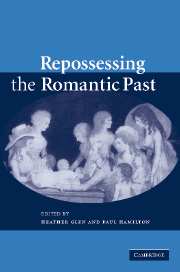Book contents
- Frontmatter
- Contents
- Notes on contributors
- Introduction
- PART I DISSENT AND OPPOSITION
- PART II REOPENING THE CASE OF EDGEWORTH
- 6 Edgeworth and Scott: the literature of reterritorialization
- 7 Maria Edgeworth and ‘the light of nature’: artifice, autonomy, and anti-sectarianism in Practical Education (1798)
- PART III DIFFERENT DIRECTIONS
- Marilyn Butler: a bibliography
- Index
7 - Maria Edgeworth and ‘the light of nature’: artifice, autonomy, and anti-sectarianism in Practical Education (1798)
Published online by Cambridge University Press: 15 December 2009
- Frontmatter
- Contents
- Notes on contributors
- Introduction
- PART I DISSENT AND OPPOSITION
- PART II REOPENING THE CASE OF EDGEWORTH
- 6 Edgeworth and Scott: the literature of reterritorialization
- 7 Maria Edgeworth and ‘the light of nature’: artifice, autonomy, and anti-sectarianism in Practical Education (1798)
- PART III DIFFERENT DIRECTIONS
- Marilyn Butler: a bibliography
- Index
Summary
In an influential account of Romantic-era writing for and about children, Alan Richardson suggests that Edgeworthian education, as elaborated in her Practical Education (1798), was fundamentally coercive and prescriptive, and sought to ‘harness’ children's ‘deconstructive energies … to the pursuit of experimental knowledge’, making ‘the love of nature’ secondary to the ‘love of science’. Claiming that the Edgeworthian intention is always to foster rationality and a coldly reductive analytical bent, Richardson criticizes the ‘mechanical character of the Edgeworths’ conception of psychic development', and alleges that this conception of the child's mind blocked sublime experience and inhibited imagination: ‘little ideas were precisely what the Edgeworths found appropriate for little minds’. He does, however, subsequently complicate this rather damning analysis, noting that ‘[t]he questions of children's imaginative reading and their religious training were more closely related in the early nineteenth century than is generally remarked’, and that it was often politically conservative and religiously orthodox educational commentators who took exception to rationalist doubts about the value of magical tales and fantastical tricks and stories. Marilyn Butler has, indeed, illuminated the extent to which Maria Edgeworth's works deliberately evoke, sometimes only via allusion, but often by explicit reference, a network of radical and variously anti-authoritarian thinkers and writers. Practical Education is no exception, and this chapter will show that, far from being coercive and prescriptive, Maria Edgeworth's first major published work was in fact, in its own time, considered offensive partly because of the way in which it rejected the fearful awe of and submission to power – divine and otherwise – that conservative contemporaries thought early education should instil.
- Type
- Chapter
- Information
- Repossessing the Romantic Past , pp. 140 - 160Publisher: Cambridge University PressPrint publication year: 2006
- 2
- Cited by

